Why A Little Bit Of Stress Is Good For You To Develop Your Full Potential
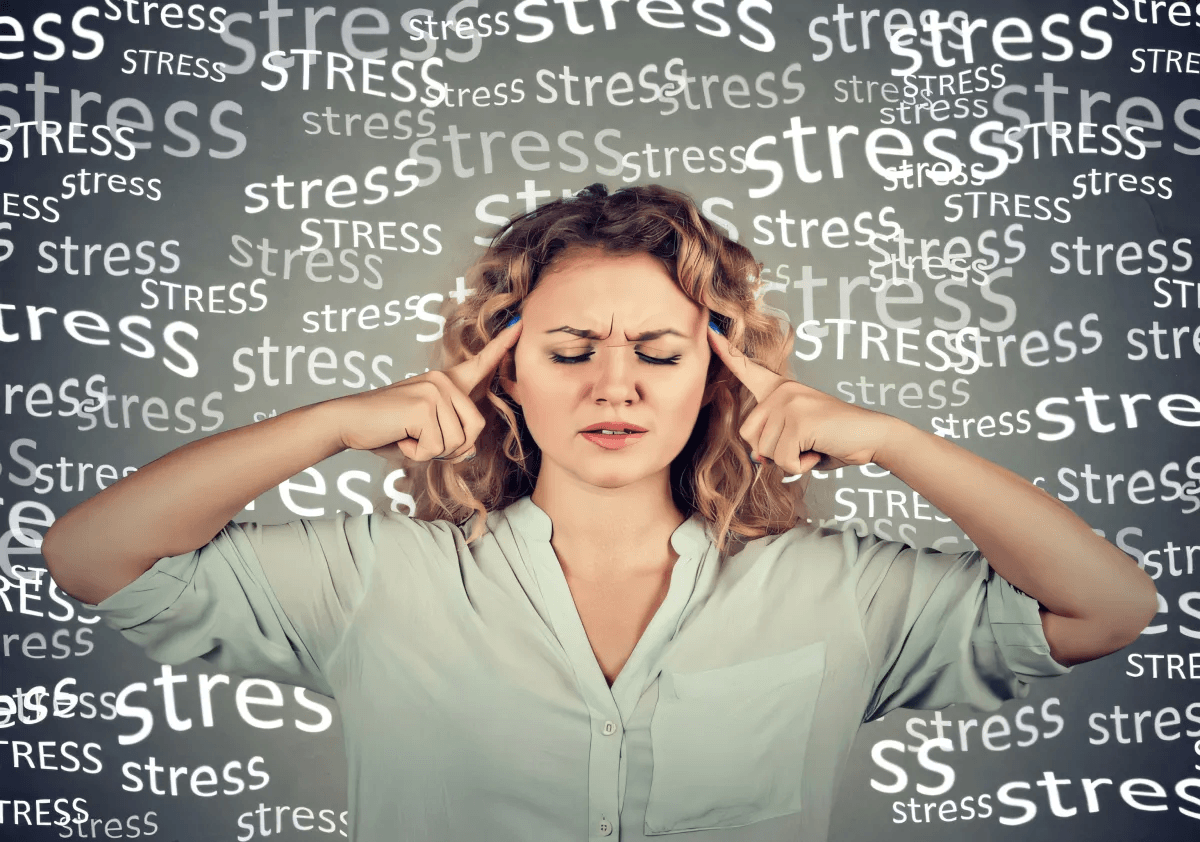
Stress is a normal reaction to everyday pressures, which may be closely related to a particular situation or event.
Our body's reactions can be physical, mental, or emotional. Being under a lot of pressure, e.g, situations when you have a lot to think and deal about, or not having enough control over what's happening.
So far there is not a clear-cut medical definition of stress and scientist have not reached a common conclusion if stress is the reason for problems or the result of them.
When stress happens, it is trying to say that something requires our attention and that we must take action. Our bodies are created in a way to experience stress and respond to it while we panic.
What causes stress
Dealing with challenges, the unknown, fears, difficult life situations, negative events, pressures, or even everyday chores trigger stress, and whatever else that causes it are known as stressors.
People generally think that stressors are negative, like having to deal with an exhausting work schedule or a strained relationship, but actually, everything that makes us go under a lot of pressure can be stressful.
The stressors can be external factors or internal, self-generated. When you think too much over something that is unlikely to happen or having negative irrational thoughts about yourself and life.
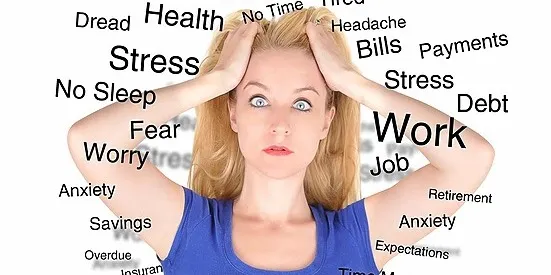
External causes of stress may include:
- Major life changes.
- Work or school overload and exams.
- Relationship difficulties.
- Financial problems.
- Being too busy and having no time.
- Family, parenting, and children.
- Death of a loved one.
Internal causes of stress may include:
- Pessimism and loss of hope.
- Being unable to accept uncertainty.
- Rigid thinking patterns, being inflexible.
- Overthinking and thinking negatively about yourself, people, and life.
- Unrealistic expectations/Perfectionism.
- All or nothing attitude.
- Your perception about situations.
- Our emotional resilience.
Money is considered to be the main reason behind stress according to American Psychological Association (APA) in the United States. While work is the next stressor in Americans' life according to the Centers for Disease and Control Prevention (CDC).
Our type of personality (being extrovert or introvert, perfectionist, type A) and resources we have in our disposition link us to all over the above stressors and may cause stress even independently too.
Other people have to deal with ongoing stress due to post-traumatic events, sexual abuse, or drug addiction. They need to be treated for PTSD. Others work very stressful jobs, like the military or in emergency services. They too need to be kept under observation for PTSD.
But happy events may cause stress as well, the first date, getting married, or becoming a parent. Due to the changes they bring in life, they generate stress. It may be unusually hard to handle because you may experience additional pressure for having to be positive.
What is healthy stress?
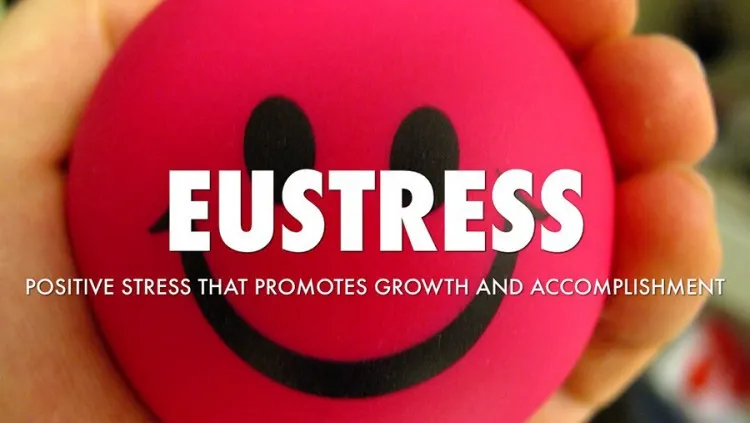
Stress is considered to be a mental or emotional strain reaction or tension that is caused by adverse circumstances. People may ask, "How is it that we stress ourselves and how can we know if the stress we are experiencing is healthy or not healthy to us?"
Apart from unhealthy stress that starts to wear on us, causes us fatigue, makes us lose interest in what we enjoy, causes us pain and irritability, healthy stress is short-termed. Let's take an example, a deadline at work or school. In this case, healthy stress is short-term lived, passes quickly, and makes us feel relieved and there are cases that it can make us feel euphoric.
Feelings of euphoria come after having achieved success and we are enjoying the results. A little bit of short-termed stress may push us forward to reach our objectives in work, school, or life. Although stress is considered at large to have very negative consequences, people feel more energetic and productive when they are under pressure.
What are the potential benefits of stress?
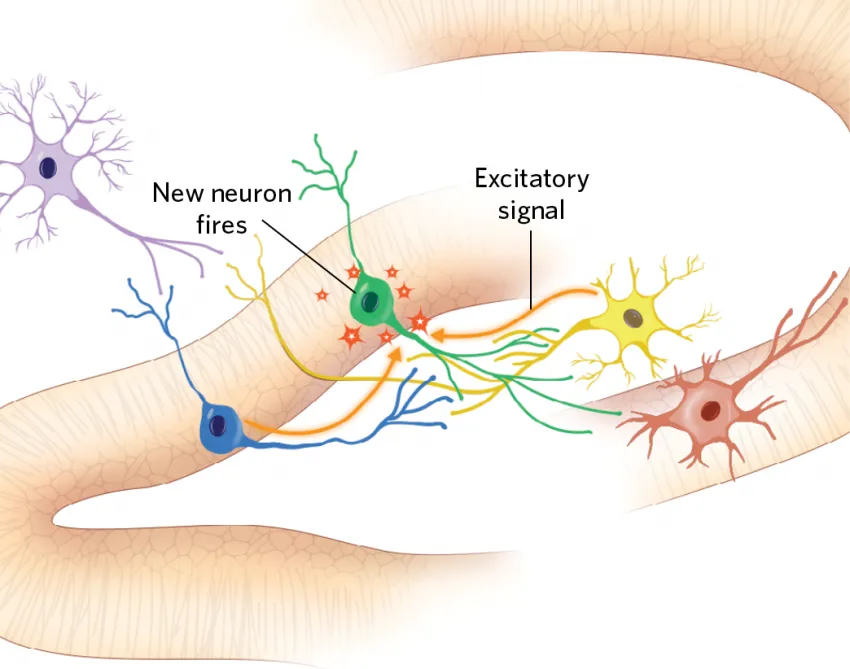
According to Daniela Kaufer, who is an associate professor at UC Berkley, she relates in an interview with the health writer, Peter Jaret that stress cannot be completely negative, it has powerful positive effects on people as well. She states that stress is a response to a threat, to help us cope with it, and learn from that experience.
As per the research conducted by scientists from UC Berkley, moderate and short-termed stress can improve alertness, performance, and improve memory. From an experiment with rats, where scientists like Daniela Kaufer work, they look in particular at the growth of stem cells in that part of the brain that is called the hippocampus. It is responsible for the stress reaction, and it plays a role in learning and memory.
They have found that when rats experience moderate stress for a short term and become mobilized for a few hours, stem cells grow, and these cells form neurons, which are brain cells. A few weeks later, results show that there is an improvement in memory and learning.
The same thing happens with people. The amount of stress that people can handle increases alertness and work performance. Just like with rats, the growth of stems cells that later become neurons leads to memory improvement and brain function.
Why is a little bit of stress good

Someone's experience who suffers from anxiety report that excessive stress causes them to go on an irrational rollercoaster at certain times, but during the moment of stress, she feels energetic and more productive. This doesn't mean she loves stress, but that she accepts the role stress plays in making her more smarter, healthier and stronger.
There is a tendency among people to consider all kinds of stress as a very negative thing, especially when the overwhelming and too much pressure prevents them from seeing the silver lining. In such cases, people find it hard to believe that there is something good in it.
I am not trying to say that "stress kills" is not true, or refuse to acknowledge chronic stress outcomes, like anxiety, tiredness, high blood pressure, depression, and PTSD.
Moderate stress is better to welcome with open arms. Only chronic stress or when we feel we have no longer control about the situation then it negatively impacts our general health and wellbeing.
Stress can play the function of a catalyst in our life when it has low levels or moderate. It can benefit us in different ways because stress plays a positive role.
1. It improves cognitive functions
As per the research conducted by UC Berkley, they found that stressful events are the cause for making their brains proliferate stem cells into new nerve cells or neurons.
This process leads to an increase in mental performance after two weeks. Moderate stress levels strengthen the connection between brain cells, i.e, neurons which enable an improvement in memory, brain function, and productivity.
2. It boosts our brainpower
Low levels of stressors activate and produce neurotrophins, a brain chemical, and strengthens the connections of brain cells in the brain.
3. It increases immunity
In the short term. Dr. Richard Shelton, who is vice chair for research in the Department of Psychiatry at the University of Alabama Birmingham, says: "When the body responds to stress, it prepares itself for the possibility of injury or infection, one way it does this is by producing extra "interleukins" - chemicals that help regulate the immune system - providing at least a temporary boost."
4. It increases our resilience
Dealing with stressful situations from time to time can train you to deal with the future ones more easily. Just like Navy SEAL training, so can be even our everyday chores and experiences, which are not so extreme.
Dr. Shelton says: "Repeated exposure to stressful events gives [SEALs] the chance to develop both physical and psychological sense of control, so when they're in actual combat, they don't just shut down."
As per the research conducted by the University of California San Fransisco in 2013, it revealed that while chronic stress promotes oxidative damage to our DNA and RNA, moderate levels of perceived daily stress protected us from such damage and increase "psychobiological resilience."
5. It increases our motivation
Good stress is called eustress in scientific community circles, and it may be just the right and only thing to get the job done at work.
Dr. Shelton says: "Think about a deadline: It's staring you in the face, and it's going to stimulate your behavior to manage the situation effectively, rapidly, and more productively."
As per the research from psychologist Mihaly Csikszentmihalyi eustresses make us enter a state of "flow", and a heightened sense of awareness.
6. It enhances child development
As per the research conducted by John Hopkins Hospital, they found that babies whose mothers went under moderate stress during pregnancy had more advanced early developed skills when they reached year two, compared with babies of unstressed mothers.
It is scientifically true that chronic stress harms babies during pregnancy, but the good news is that moderate levels of normal stress, don't hurt the baby, it surprisingly benefits him.
How can stress make you stronger?
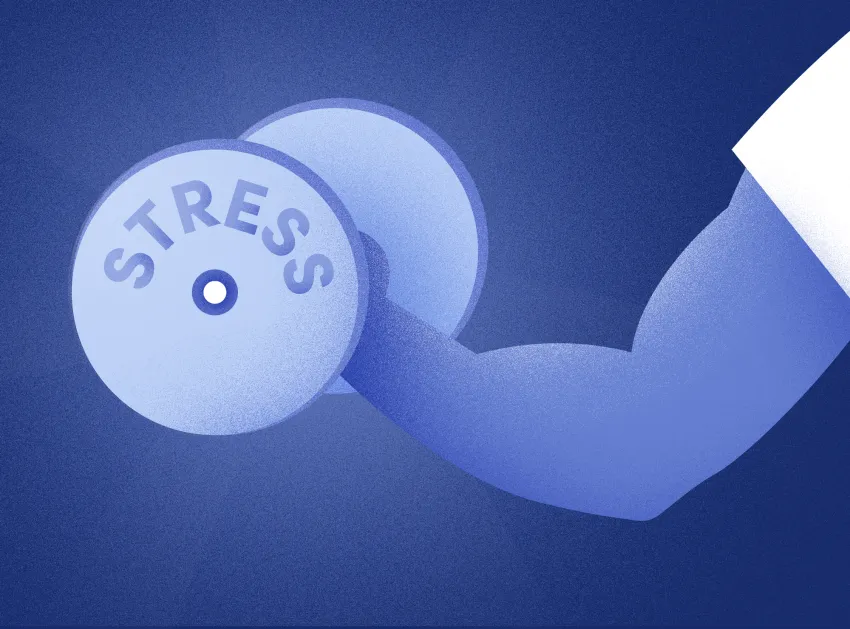
According to the research of Standford psychology Assistant professor Alia Crum, looks at stress as a helpful part of our life, instead of considering it harmful, it results in better health, emotional wellbeing, and more productivity at work - even during experiences of high stress.
How we consider stress defines how we react to it. Looking at it as harmful makes people cope with it in less helpful ways, like indulging in alcohol and drugs to "release" stress, procrastinating everything to avoid stress, or imagining dark scenarios. There are studies that show that having the goal in mind to avoid stress increases the chances of depression, separation, losing the job, if people rely on harmful coping strategies.
On the contrary, people who look at stress more positively handle it in such ways that help them thrive, whether addressing the origin of stress, asking for social support, or trying to find the wisdom in it. "At least half and maybe two-thirds of people who've faced trauma report some kind of positive development or personal growth afterward," says Richard Tedeschi, a professor of psychology at the University of North Carolina at Charlotte.
He further says: "But those who are willing to face their troubles, rather than avoid and trying to ignore them, are more likely to come away with an enhanced sense of purpose, a deeper sense of meaning, or stronger connections with loved ones than those who aren't." There is an increase in the number of scientists who have started to defend against stress.
New studies are revealing that if people consider stress as a positive force, they can better protect themselves from its harms - and use it to learn, grow and thrive. "Our fight or flight response was designed to keep us safe and help us meet the demands we face every day," says Alia Crums. Stress might help people become stronger, faster, more energetic, and even more compassionate.
According to Kelly McGonigal, a business school lecturer at Standford and program developer for the Standford Center for Compassion and Altruism Research and Education, she relates: "Once you appreciate that going through stress makes you better at it, it can be easier to face new challenges."
Marilyn Tam's story
Marylin Tam is an author, speaker, consultant, and executive business coach. She has a very busy schedule and dealing with all these roles she has to maintain a loving home life, her personal physical and emotional spiritual health, which is a lot to handle. Stress can pretty well consume her trying to deal with all the activities in her life. Furthermore, she is a recovering perfectionist.
She relates:" OK, we know that stress can be bad for you, what can you do about it? Life is not getting simpler and the to-do list keeps on getting longer. For me what has worked best is to stop. Stop whatever I'm doing or stressing about and ask myself the question, "What is the worst that is going to happen if this didn't work out?" The worst fear in my mind is usually even more dreadful than what really could happen. That gives me the perspective and calms me a bit."
To proceed with the story of Marilyn and how her story has evolved she further relates: "Then I ask myself, is this in line with my life purpose? When we look at the bigger picture of what's most important we realize that the issue we are dealing with probably is not going to kill us or the ones we love. The next step is to assess the situation and determine what can we do to take care of it."
She continues to tell her story and how she copes with her stress. "Breathing deeply and regularly helps to steady my mind and some physical movement, as shrugging my shoulders, moving my arms and walking helps shift my anxiety to allow me to re-center. Once I am more relaxed, the solutions appear easier. Sometimes just stepping away from the challenge for a while gives me a clearer approach to resolving it."
She continues to find difficulties in handling stress but what she learned during her journey she tells us: "I would be joking if I told you that I'm serene all the time. I still have bouts of anxiety of having to perfect from my childhood-ingrained conditioning. What I am now able to do quickly is to identify the stress symptoms and go into my "stop, ask, assess, breath, resolve" process.
To conclude she says: "Life is a continuous discovery and adventure. How we choose to deal with each circumstance is up to us. We can choose to recognize and let go of unhealthy stress. May you always live knowing that indeed at all times we have a choice. Your good health, happiness, and life depend on it!"
Final thoughts
We try to get protection and nurture what is precious to us, which can come from family life, workplace demands, or relationships challenges. This kind of stress often may cause behavioral, physical, and psychological issues. Even if going under excessive stress due to the above-mentioned factors, we must remind ourselves that these demands are not the main cause of psychological strain experiences.
The amount of strain experiences we have in our lives is predefined by whether or not we are in control of the effects of stress. So far people have considered stress as something to get rid of it or their lives once and for all.
But with the latest researches, we have learned about the other side of stress, and it can be our friend if we understand and embrace it. The secret lies in understanding good stress from bad stress, as long as it's not chronic, stress can be a very positive factor in our life.
References:
- American Psychological Association. Stress relief is within reach. American Psychological Association. Accessed date Sept. 21, 2021. https://www.apa.org/topics/stress
- Bharghava, Hansa D. Stress. WebMD. August 14, 2020. https://www.webmd.com/balance/stress-management/what-is-stress
- Caleb, Onah. There Are Psychological Benefits of Stress. Here Are Some of Them. Psychreg. June 25, 2020. Updated on August 30, 2020. https://www.psychreg.org/psychological-benefits-of-stress/
- Cleveland Clinic team. Stress. Cleveland Clinic. Last medically reviewed January 28, 2021. https://my.clevelandclinic.org/health/articles/11874-stress
- Dominisse, Lisa A. Healthy vs Unhealthy stress. Family Service Society. n.d. http://www.famservices.com/healthy-vs-unhealthy-stress/
- Felman, Adam. Medically reviewed by Stacy Sampson. D.O. Why stress happens and how to manage it. MEDICAL NEWS TODAY. March 12, 2020. https://www.medicalnewstoday.com/articles/145855#causes
- Graves, Ginny. Stress Can Make You Stronger And Happier, Says Science. Prevention. Nov. 29, 2017. https://www.prevention.com/life/a20508569/stress-makes-you-stronger/
- Higuera, Valencia. Medically reviewed by Timothy J. Legg., Ph.D., 4 Surprising Health Benefits of Stress. HealthLine. August 14, 2018. https://www.healthline.com/health/benefits-of-stress-you-didnt-know-about#Good-stress-vs.-bad-stress
- Jaret, Peter. The Surprising Benefits of Stress. Greater Good Magazine. October 20, 2015. https://greatergood.berkeley.edu/article/item/the_surprising_benefits_of_stress
- MacMillan, Amanda. 5 Weird Ways Stress Can Be Good for You. Health. Updated August 18, 2014. https://www.health.com/condition/stress/5-weird-ways-stress-can-actually-be-good-for-you
- Mind team. How to manage stress. Mind. November 2017. https://www.mind.org.uk/information-support/types-of-mental-health-problems/stress/what-is-stress/
- Parker, Clifton B. Embracing stress is more important than reducing stress, Standford psychologist says. Standford News. May 7, 2015. https://news.stanford.edu/2015/05/07/stress-embrace-mcgonigal-050715/
- Scott, Elisabeth, MS. Medically reviewed by Amy Moring LCSW. The Main Causes of Stress. verywellmind. June 29, 2020. https://www.verywellmind.com/what-are-the-main-causes-of-stress-3145063
- Scott Elisabeth, MS. What Is Stress? verywellmind. Updated on August 03, 2020. https://www.verywellmind.com/stress-and-health-3145086
- Segal, Jeanne, Pd.D., Smith, Melinda, M.A., Segal, Robert, M, A., and Robinson, Lawrence. Stress, Symptoms, Signs, and Causes. HelpGuide. May 2020. https://www.helpguide.org/articles/stress/stress-symptoms-signs-and-causes.htm
Opinions and Perspectives
Never thought about stress as something that could actually make us stronger.
Really appreciate how this article balances both positive and negative aspects of stress.
The comparison to physical exercise makes perfect sense. Its all about the right amount.
Fascinating how our mindset about stress can actually change its physical effects.
Wonder if this explains why some of my best work comes from last-minute pressure.
The research about stem cells is mind-blowing. Changes how I view stress completely.
Great insights about how stress can actually make us more compassionate and connected.
This article helped me understand why I sometimes miss the excitement of deadlines.
Never considered stress could have evolutionary benefits before reading this.
The research about memory enhancement under stress explains a lot about my exam experiences.
Interesting balance between acknowledging benefits while warning about chronic stress.
This actually helps explain why I sometimes perform better under pressure.
The part about stress improving resilience really resonates with my life experiences.
The brain cell connection research is incredible. Who knew stress could actually improve brain function?
The connection between stress and improved immunity is fascinating. Never knew that before.
Interesting how our attitude toward stress can change its impact on our body and mind.
The perspective on stress as a tool for growth rather than an enemy to fight is revolutionary.
Really appreciate how this article breaks down the difference between acute and chronic stress.
The research about pregnancy stress is eye-opening. Nature is more complex than we think.
The flow state connection makes so much sense. I've experienced that perfect stress sweet spot.
Never thought about stress preparing our bodies for potential injury or infection. Evolution is amazing.
The comparison between good and bad stress is helpful. Makes it easier to recognize when to worry.
Amazing how changing our perception of stress can actually change its effects on us.
Kelly McGonigal's point about stress making us better at handling future challenges is encouraging.
The link between stress and motivation is spot on. I definitely need some pressure to get moving.
Makes me think differently about protecting kids from all stress. Maybe some is necessary for growth.
This information would have been helpful during my college years when I thought all stress was bad.
Interesting how stress can improve cognitive function. Explains why I think clearer with deadlines.
As a teacher, I see this in my students. A little pressure often brings out their best work.
Wonder if this explains why some people thrive under pressure while others crumble.
This reminds me of how athletes use stress to enhance performance. It's all about the right amount.
Understanding that stress has benefits actually helps reduce my anxiety about being anxious.
The article could have included more practical tips for maintaining healthy stress levels.
Marilyn Tam's approach to stress management seems practical. I'm going to try her stop-and-assess method.
The research about stem cells and memory improvement is groundbreaking. Changes everything I thought I knew about stress.
Anyone else find it ironic that reading about stress is making them feel less stressed?
The immune system boost from short-term stress is particularly relevant given current health concerns.
Looking at stress as a tool rather than an enemy is a powerful mindset shift.
This validates what I've experienced in sports. The right amount of pressure improves performance.
I like how they mentioned happy events causing stress too. My wedding planning was definitely stressful but in a good way!
The comparison to physical exercise makes sense. A little strain makes us stronger, too much breaks us down.
As someone dealing with PTSD, I wish the article went deeper into how to distinguish between healthy and unhealthy stress.
The part about stress enhancing child development really surprised me. Nature is fascinating.
This explains why I sometimes miss the pressure of deadlines when I have too much free time.
I appreciate how the article differentiates between internal and external stressors. Really helps understand the whole picture.
Interesting perspective, but let's not downplay how devastating chronic stress can be.
The flow state connection is interesting. Sometimes stress helps me get in the zone.
I'm skeptical about some of these claims. Would like to see more long-term studies on the benefits.
The brain cell connection findings are incredible. Who knew stress could actually make us smarter?
What I got from this is that it's not about eliminating stress, but managing it effectively.
The research about stress improving memory and learning is fascinating. Makes me feel better about my exam anxiety.
Yes! Finally someone addressing the positive aspects of stress. I've always performed better under a little pressure.
The concept of eustress versus distress is key here. We need to better understand the difference.
After reading this, I'm going to try reframing how I think about stress. Maybe it can be my ally instead of my enemy.
I find it interesting how money and work are the top stressors in the US. Really shows where our society's priorities lie.
The article makes a good point about stress being a natural response to help us cope with threats. We've evolved with it for a reason.
Not buying it. Stress has caused me nothing but health problems. Maybe this works for some people, but not everyone.
I can relate to Marilyn Tam's story about being a recovering perfectionist. Her stop-and-assess approach seems really practical.
The research from Stanford about mindset is game-changing. Just by viewing stress differently, we can change how it affects us.
What about the findings regarding pregnant women? That was unexpected. I always thought all stress during pregnancy was bad.
My personal experience aligns with this. Whenever I have a deadline approaching, I feel more alert and focused. It's like my brain kicks into a higher gear.
The part about Navy SEAL training really puts things in perspective. If we never face any stress, how can we build resilience?
I struggle with anxiety, and it's hard for me to see any benefits in stress. Though I must admit, some of my best work comes when I'm under a bit of pressure.
The distinction between healthy and unhealthy stress is crucial. I love how the article explains that short-term stress can actually boost immunity and improve cognitive function.
But isn't all stress harmful? I've always been told to avoid it completely. This seems counterintuitive to me.
I agree. As someone who works in a high-pressure environment, I've noticed that moderate stress helps me stay focused and perform better. It's all about finding the right balance.
Fascinating article! I never thought stress could actually have positive effects. The research from UC Berkeley about stem cell growth in the hippocampus is particularly interesting.
